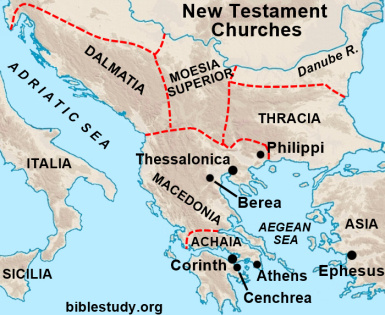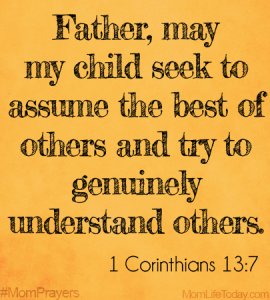1 Thessalonians Sermon Series
Standing Firm: Foundational Doctrine For New Believers
Standing Firm in Our Salvation
1 Thessalonians 1:1-10
Introduction
When Paul, Silvanus (another name for Silas), and Timothy enter into Thessalonica on their second missionary journey it would have been the first time that this city would have heard about Jesus and the Gospel. Acts 17 records the amazing results of their ministry of less than a month, Acts 17:4-5 “And some of them were persuaded and joined Paul and Silas, as did a great many of the devout Greeks and not a few of the leading women. 5 But the Jews were jealous, and taking some wicked men of the rabble, they formed a mob, set the city in an uproar, and attacked the house of Jason, seeking to bring them out to the crowd.”
“In those few short weeks, a small group of Thessalonians came to know Jesus Christ as Savior. Persecution broke out almost immediately, forcing Paul and his companions to leave after ministering for three Sabbath days.”[1] So later he sends this young church a letter to encourage them in their new faith.
They didn’t have the New Testament, they were suffering under persecution, some had even died as a result – all they had were what Paul, Silas, and Timothy taught them over those few short weeks. Paul is concerned that this group of new believers would be discouraged and go back to what they knew before. So, he writes them a letter.
The Gospel is Powerful To Change Us (vv. 1-6)
Paul, Silvanus, and Timothy,
To the church of the Thessalonians in God the Father and the Lord Jesus Christ: Grace to you and peace. 2 We give thanks to God always for all of you[2], constantly mentioning you in our prayers, 3 remembering before our God and Father your work of faith and labor of love and steadfastness of hope in our Lord Jesus Christ. 4 For we know, brothers loved by God, that he has chosen you, 5 because our gospel came to you not only in word, but also in power and in the Holy Spirit and with full conviction. You know what kind of men we proved to be among you for your sake. 6 And you became imitators of us and of the Lord, for you received the word in much affliction, with the joy of the Holy Spirit,
 (v. 2) “We give thanks to God always for all of you,” – Paul is thankful for the church in Thessalonica because of (v. 3) “work of faith and labor of love and steadfastness of hope in our Lord Jesus Christ.”[3] This triad of faith, love, and hope are a “shorthand summary of the essentials of Christianity: They are linked to something toilsome and hard – faith as the assurance that God has acted in Christ to save his people, love as the present expression and experience of the restored relationship between God and his people, and hope as the confidence that “he who began a good work . . .will carry it on to completion” (Phil. 1:6), and that the future, therefore, holds not “wrath but . . . salvation through our Lord Jesus Christ.”[4]
(v. 2) “We give thanks to God always for all of you,” – Paul is thankful for the church in Thessalonica because of (v. 3) “work of faith and labor of love and steadfastness of hope in our Lord Jesus Christ.”[3] This triad of faith, love, and hope are a “shorthand summary of the essentials of Christianity: They are linked to something toilsome and hard – faith as the assurance that God has acted in Christ to save his people, love as the present expression and experience of the restored relationship between God and his people, and hope as the confidence that “he who began a good work . . .will carry it on to completion” (Phil. 1:6), and that the future, therefore, holds not “wrath but . . . salvation through our Lord Jesus Christ.”[4]
Paul is thankful for how God has worked in the Thessalonian church, and he is praying for them because of their:
work of faith – Paul is clear that our salvation does not come from work, we cannot earn our salvation. But, when that is clearly understood Paul shows again and again that our salvation should produce a work – We work and serve because of our faith (Eph. 2:8-10; James 2:14). Hobbs says, “The word rendered “work” connotes the general idea of work or business, daily tasks or employment. Whatever they did, it was a work characterized by faith. It was the activity which faith inspired.”[5]
labor of love – labor means “toilsome, wearisome work. It is laborious toil done for love’s sake.”[6] Paul uses the word agape here for love, it is a love that characterizes God’s nature (1 John 4:8). We do the hard things because we love God, and other human beings. In other places, Paul tells us that even though we may toil and labor if there is no love behind it, it is worthless.
steadfastness of hope – William Barclay says: “It is the spirit which can bear things, not simply with resignation, but with blazing hope.”[7] The steadfastness connotes an athlete or soldier who could endure his opponent’s attack, yet possess reserve strength with which countercharge to victory.[8]
(v. 4) “For we know, brothers loved by God, that he has chosen you” – The emphasis is one of knowledge of their certainty of salvation, not on the reasons for their being chosen. These missionaries see in those that they shared the gospel with, a reaction to that message – they know that they are saved (or chosen by God unto salvation) because of what they are doing. “There is evidence of their genuine faith and fervent ministry for Christ. They are known by their fruits.”[9]
(v. 5) “because our gospel came to you not only in word, but also in power and in the Holy Spirit and with full conviction.” There were times when Paul was told not to preach the gospel (Acts 16:6 f.), “Sometimes he had spoken fearfully and haltingly (1 Cor. 2:3). He had undoubtedly preached to people and felt it was hopeless, but here, with the Thessalonians, it was different.”[10]
The gospel came to them in power, this is where we get the word dynamite from – the gospel were not just words, the gospel was explosive, “it demolished the false idols” and false gods.
This power was linked with the Holy Spirit – the Spirit and power of the gospel go together. This was promised by Jesus in Acts 1:8 “But you will receive power when the Holy Spirit has come upon you, and you will be my witnesses in Jerusalem and in all Judea and Samaria, and to the end of the earth.”[11] When Paul spoke, God spoke through him. When you speak the gospel – there is power there because God is speaking thorough you.
How does Paul know they are saved? How does anyone know if someone else is saved? Paul says their response to the gospel “came in power, it was not simply an emotional experience nor had they been swept off their feet by Paul’s oratory. This was unmistakably the power of the Holy Spirit at work. It all deals with the way the Word was received. It is one thing to preach the Word, it is another thing to receive the Word.[12]
They received the Word 1) and became followers of Paul, 2) they received the Word in spite of persecution 3) they received it with joy of the Holy Spirit.
Even though Paul, Silas, and Timothy were not there very long, there were those who would try to discredit them. These people would come behind them and try to get these new believers to doubt their decision to “turn to God” from idols.[13]
It is as if Paul was saying, “Do not be deceived by the enemies of the faith who are trying, by means of an attack on our integrity, to undermine your faith and your assurance of salvation. Our behavior among you was proof of our integrity and of the reliability of our message. . .”[14] Paul, Silas, and Timothy were focused on this new church receiving the gospel and teaching them foundational doctrines, not on their own welfare.
How is it that people know that we are genuine believers who only want others best interest? It’s not enough just to present the gospel, how the presenter shares it is also incredibly important. These missionaries had integrity and were a worthy example to follow. They were genuine in their faith and in their intention to see people saved for Christ. They practiced what they preached (genuine), and their concern was truly for others receiving the gospel (compassionate), “to be among you for your sake.”
(v. 6) “for you received the word in much affliction” – The word “affliction” outside of the Bible usually means pressure, and that of a severe kind. The word was used of pressing grapes in the winepress until they burst, and so metaphorically means very great trouble. Paul, Silas, and Timothy had been run out of town for their preaching, and now this young church was also being “afflicted.”[15]
“The city was the home of two of the recognized mystery religions that were to be found everywhere throughout the Hellenistic, or eastern, half of the Roman Empire. These were the religion of Dionysus the dying and rising god, and Orpheus . . . Both of them were fertility cults . . . Further, at that time emperor worship was becoming actively practiced. . .”[16]
“The refusal of new Christian converts to participate in “normal” social and cultic activities and the exclusivity of their claim to worship the only “living and true God (1:9) would have left non-Christian friends feeling offended, resentful, or betrayed; similarly, family members would have viewed a refusal to maintain ancestral traditions as evidence of an appalling lack of concern for family responsibilities.
Moreover, since civic peace, agricultural success, and freedom from natural catastrophe were thought to lie in the hands of the traditional gods, it was considered extremely dangerous to ignore or offend them.”[17]
Martin Luther once said, “If Christ wore a crown of thorns, why should His followers expect only a crown of roses?”
The Gospel is Powerful to Change Others (vv. 7-10)
7 so that you became an example to all the believers in Macedonia and in Achaia. 8 For not only has the word of the Lord sounded forth from you in Macedonia and Achaia, but your faith in God has gone forth everywhere, so that we need not say anything. 9 For they themselves report concerning us the kind of reception we had among you, and how you turned to God from idols to serve the living and true God, 10 and to wait for his Son from heaven, whom he raised from the dead, Jesus who delivers us from the wrath to come.
 The Thessalonians not only had the Word come to them, they not only had received the Word of God, but their salvation was manifested in their life and testimony. Their trust in Christ resulted in a transformed life that even other believers could follow their example. The result of the faithfulness of these Christians was that they became an example to other believers.
The Thessalonians not only had the Word come to them, they not only had received the Word of God, but their salvation was manifested in their life and testimony. Their trust in Christ resulted in a transformed life that even other believers could follow their example. The result of the faithfulness of these Christians was that they became an example to other believers.
If we are to win the world for Christ, it won’t be with words only – “the evidence must come from our lives. The church must be ablaze with the divine nature, and the living Christ must spring into attractive vitality in the lives of its members. In them the vision must be verified, and Word made flesh. “Christ who lives in me.”” (Gal. 2:20)[18]
(v. 7) The Thessalonian church were imitators of Paul, Silas, and Timothy, and they “became an example to all the believers in Macedonia and in Achaia”
“the word of the Lord sounded forth[19] from you” – “Sounded” means “to sound as a trumpet, to thunder, to reverberate like and echo.”[20] Even with all the persecution, and attacks, and inexperience, this church has found a way to transmit the gospel like a radio station to those all around them.
Paul didn’t have to tell others about what God was doing Thessalonica, “your faith in God has gone forth everywhere, so that we need not say anything.” “The city was on a major trade route, the people passing through Thessalonica came into contact with the aggressive evangelism and testimony of these Christians who lived there.”[21]
(v. 9) “how you turned to God from idols to serve the living and true God” – The word “turned” here is given in the aorist tense, meaning a definitive decision made once. It was not a turning process, not “turning to” God – In a single, deliberate choice, they turned to God from idols. “There was a complete turn-about in the direction of their lives.”[22] That turning to God resulted in their serving Him.
Many say that Christians are intolerant and dogmatic – Here Paul says very clearly that Christianity, by its very nature, is intolerant. Paul is advocating the faith, not a faith. The Romans had no problem with Christians saying, they were on more religion, operating among the other religions. They had a problem when Paul quoted Christ, when He said, “I am the way, . . .no man comes to the Father except through me.” Jesus is the only way.
(v. 10) “to wait for his Son from heaven, whom he raised from the dead, Jesus who delivers us from the wrath to come” – The Lord’s coming back is mentioned in every chapter in 1 Thessalonians. Paul tells them they have a present work to do now, share the gospel, continue to live out a life as an example, but also there is a future hope.
The word “wait” is given in the present tense. They had turned to God in one deliberate choice, but there remained the constant day-after-day expectation. They were constantly looking for the return of the Lord. But not as the early disciples who sat by Jesus’ tomb, the angel told them, Acts 1:1-11 “And while they were gazing into heaven as he went, behold, two men stood by them in white robes, 11 and said, “Men of Galilee, why do you stand looking into heaven?” Serving the risen Lord, and waiting for His return go together.
Paul reminds us that Jesus died for the sins of mankind (delivering us from the wrath to come) on a Roman cross and was placed in tomb, where he then was raised from the dead, and has returned to Heaven. Now we who have turned to God through faith in Christ wait for His return.
“from the wrath to come” – Paul closes chapter 1 with the reminder that there is a day of judgment that is to come. God is going to judge this sinful world. You don’t have to talk with people about Jesus, or share the gospel very long before you will hear someone says, “If God is all powerful then why is there sin in the world today.”
They will give an example of a horrific sin, and then say, if God is all loving then why would He allow an innocent to suffer in that way? (the Jewish Holocaust, child sex trafficking, rape, murder, etc.)
It’s because God has given people the dignity and freedom of choice. If nothing bad would ever happen as a result of those decisions, then there is no true freedom to choose. There is also the result of sin that caused the world to be fallen, so we have mental illness, disease, cancer, etc. There will come a day when all of the results of sin will be made right again.
Paul tells us here that judgment of sin is coming – there will be a day when the wrath of God will be poured out upon mankind for all those sinful decisions. But, “Jesus who delivers us from the wrath to come . . .” These believers in Thessalonica can rest in the peace that God has provided a plan for them to escape from that wrath, through their faith in Jesus Christ.
The word used for wrath is When discussing God’s wrath John the Baptist used this same word (Matthew 3:7). He saw this wrath as a desert fire, everywhere, before which snakes would flee. Where can one find safety from a desert fire? Where the fire has already burned. Where may one find safety from God’s wrath, You can find safety where God’s wrath has already been poured out at its’ worst, at Calvary.
Our deliverer is Jesus, “the historic, crucified, risen, ascended, and returning Son of God.”
________________________________
[1] John F. Walvoord, The Thessalonians Epistles (Grand Rapids, Michigan; Dunham Publication, 1968) 7.
[2] A better translation is “for you all” – or “all y’all”
[3] Romans 5:1-5; 1 Corinthians 13:13; Galatians 5:5-6; Colossians 1:4-5; Hebrews 10:22-24; 1 Peter 1:21-22 – all have the triad of faith, hope, and love. Also, when these three words are given, the author usually places them in an order where the emphasis of the author is on the last word. Here, hope is given last and with the mentioning of Christ’s return in every chapter, hope of His return is emphasized.
[4] Michael w. Holmes, The NIV Application Commentary, 1&2 Thessalonians (Grand Rapids, Michigan; Zondervan Publishing, 1998) 48.
[5] Clifton J. Allen, General Editor, The Broadman Bible Commentary, 2 Corinthians-Philemon (Nashville, Tennessee; Broadman Press, 1971) 265.
[6] Ibid, 265.
[7] Leon Morris, The New International Commentary on the New Testament, The First and Second Epistles to the Thessalonians (Grand Rapids, Michigan; WM. Eerdmans Publishing Co., 1984) 53.
[8] Allen, 265.
[9] Ibid, 266.
[10] Morris, 56.
[11] Concepts of Spirit and power going together; Romans 1:4; 15:13, 19; 1 Corinthians 2:4; Galatians 3:5; Romans 1:4; 2 Timothy 1:7,8.
[12] Walvoord, 15.
[13] William Hendriksen, New Testament Commentary, Thessalonians, Timothy and Titus (Grand Rapids, Michigan; Baker Publishing, 1987) 50.
[14] Ibid, 50.
[15] Morris, 58.
[16] George Arthur Buttrick, General Editor, The Interpreter’s Bible, Volume 11 (Nashville, Tennessee; Abingdon Press, 1955) 245.
[17] Homes, 48.
[18] Buttrick, 261.
[19] “to ring out” (execheo), found only here in the NT.
[20] Allen, 268.
[21] Walvoord, 16.
[22] Hendriksen, 51.
 I wrote this article years ago and have held off posting it because as a staff person, I didn’t want a particular pastor or church to see this and to try and “read between the lines.” Most of this are lessons I have learned as serving as a senior pastor and the mistakes I have made as a senior leader. Having served in most typical church positions (excluding music) and as an executive director, these are lessons from various churches, various positions, various regions of the country. That being said, now the article.
I wrote this article years ago and have held off posting it because as a staff person, I didn’t want a particular pastor or church to see this and to try and “read between the lines.” Most of this are lessons I have learned as serving as a senior pastor and the mistakes I have made as a senior leader. Having served in most typical church positions (excluding music) and as an executive director, these are lessons from various churches, various positions, various regions of the country. That being said, now the article.



 John 10: 25 “…The miracles I do in my Father’s name speak for me, …” Miracles were expressions of God’s salvation and glory.
John 10: 25 “…The miracles I do in my Father’s name speak for me, …” Miracles were expressions of God’s salvation and glory.